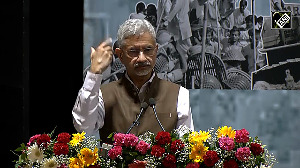The Iraq market finally appears to have opened for the Indian steel producers and may prove to be the next big market after China.
Ispat Industries has bagged two contracts from Iraq directly from the customers. Vinod Garg, director (marketing), Ispat Industries, said, the company has got two orders -- one for 8,000 tonne and another for 13,000 tonne of hot rolled coils.
| |||||||||||
Though, Ispat had already registered with Bechtel Corporation, which bagged the $680 million contract for reconstruction projects in Iraq, the contracts bagged were not through Bechtel. Bechtel had also won the contract to rebuild Kuwait after the first Gulf war in 1991.
Industry sources said, there is tremendous opportunity for Indian producers as the Bechtel contract contains no "Buy American" provision, which implies that the global company is likely to source materials from most convenient and cheap sources except six countries -- Cuba, Iran, Laos, Libya, North Korea and Syria, and not necessarily from domestic downstream suppliers.
Moreover, India has proved to be a good supplier on merit before the war.
Garg added that realisations in Iraq are even better than China.
While prices in China are around $320 per tonne, prices in Iraq are in the region of $350. Even after factoring in the freight rates, prices in Iraq work out to be still higher than China.
However, Steel Authority of India Ltd sources said, the company is in discussions with Bechtel, but nothing has fructified, as yet.
The opening of the Iraq market is crucial for the Indian steel majors at this juncture, as the steel makers are observing restraint in exports to China, which had been importing steel voraciously.
It may be mentioned, exports to China have crossed 3 per cent of China's total imports, which technically can attract safeguard measures.
In fact, the Chinese government has already communicated their concerns to our government.
Industry sources said, once the Iraq market opened up, the demand would surge for the next 2-3 years.
The initial demand is expected to come from the long products segment and the demand for flat products would emerge after the completion of the first phase of infrastructure projects.




